On June 7, 2023, the UN General Assembly adopted a resolution prepared by Georgia on the situation of internally displaced persons and refugees from South Ossetia and Abkhazia (document A/77/L.73). The Georgian delegate who introduced the draft resolution stated that it was “purely humanitarian” in order to “avoid any political speculation when the basic rights of displaced persons are at stake”. However, for those who know the true history of the events following which this text was presented first, it is obvious that the ritual introduction of the draft resolution on refugees, organized by Georgia at the UN platform annually since September 9, 2009, is nothing more than another act of repeated political farce.
Representatives of a number of countries who spoke after the Georgian delegate readily took advantage of the discussion of the draft for another aggressive attacks and absurd accusations against the Russian Federation and the Republic of South Ossetia. Judging by these statements, it is quite obvious that the problem of refugees interests their authors in the very last place, as, in fact, the authors of the Georgian project. Of course, in the speeches and in the text of the resolution there were words about the rights of “forcibly displaced persons”, first of all “the right to voluntary, safe and dignified return”, “respect for human rights” and other familiar formulas from the phraseological dictionary of international humanitarian law, which mask a number of theses of Georgian political propaganda, leading to the idea that Georgia is an innocent victim of a “violent change in the demographic situation”. The poorly concealed purpose of this simple trick is, under the pretext of caring for refugees, to gain support for Georgia's claims to jurisdiction over South Ossetia and Abkhazia, to accuse Russia of “occupation” and “aggression”. Of course, not a single word mentions that the “change in the demographic situation” and the refugee flows were caused by Georgia's armed aggression against South Ossetia and Abkhazia; nothing is said in the resolution about ethnic cleansing of the Ossetian population, nor does it mention the genocide of the Ossetians. It is not said that the number of Ossetian refugees is several times higher than the number of ethnic Georgians who lived in South Ossetia and left for Georgia from South Ossetia before the invasion of the Georgian army. There is not a word about the war crimes committed by the Georgian army and militants of various Georgian formations.
Did the delegates who voted in support of the Georgian project know what was behind the set of words they support? Of course, some of the delegates could have been fully aware, but they were forced to proceed from the position of their governments. The other part also definitely knew and would have been more restrained in supporting the draft Georgian resolution if not for the obvious pressure from a group of Georgia's Western partners. But the meeting of the General Assembly was attended by delegates who simply had no idea about the essence of the problem that the resolution was dedicated to. It would be really important for them to listen to an alternative point of view, as is usually practiced in the UN, however, in response to the appeals regarding the possibility of presenting their position in an acceptable format provided for by the practice of the United Nations, the Ossetian and the Abkhaz representatives always received embarrassed silence or vague promises to “work out the issue”.
The double standards applied to South Ossetia and Abkhazia on the one hand and to Georgia on the other, seem to be another confirmation of the crisis in the system of international relations, but this does not make it any easier for the refugees, about whom the authors of the resolution allegedly care. The only platform where it is possible to discuss and find solutions to the problem of refugees and other categories of displaced persons with the participation of all interested parties is the Geneva International Discussions, where the refugee problem was initially discussed in accordance with the agreements of September 12, 2008. Moreover, refugees began to return to South Ossetia and Abkhazia. However, Georgia decided to politicize the refugee problem, use it to promote its propaganda, to mislead the world community and take political revenge for the failure of the military adventure of the Saakashvili regime. In September 2009, Georgia submitted its draft resolution on refugees to the General Assembly for the first time, which was reasonably perceived in Tskhinvali and Sukhum as an unscrupulous and dishonest attempt to exert gross political pressure on the Ossetian and the Abkhaz parties. Consideration of the refugee problem had to be postponed until Georgia made a choice in favor of common sense between organizing performances on the stage of international organizations and a practical discussion of the refugee problem in its humanitarian aspect.
Ossetian and Abkhaz representatives have repeatedly stated that Georgia's politicization of the refugee problem undermines the work on this issue in the framework of the Geneva discussions. Since Georgia prefers to discuss issues related to the situation of refugees and other categories of displaced persons in such an authoritative international body as the UN General Assembly, South Ossetia and Abkhazia insist on their right to participate in the discussion of this problem within the walls of the UN. As long as political games continue around the refugee problem behind the backs of Abkhazia and South Ossetia, the discussion of this issue in the framework of the Geneva discussions will not make any sense.
Tskhinval, June 15, 2023
